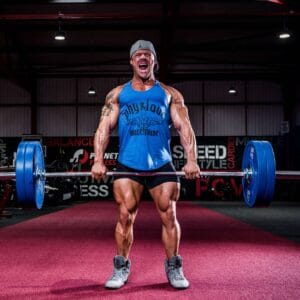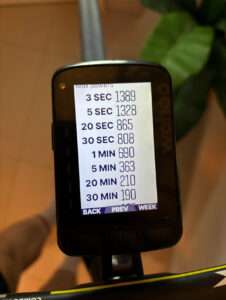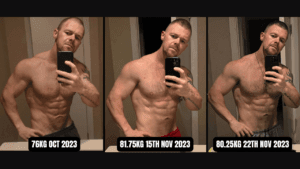 Anyone that knows me and knows me well, knows that I’ve always been fascinated with peak performance. I started lifting weights to improve the way I looked but I found myself becoming addicted to the way it made me feel. There was, still is, and will always be something about pushing myself to my limits, breaking through my once-perceived limitations, to create an exhilarating adaptive environment.
Anyone that knows me and knows me well, knows that I’ve always been fascinated with peak performance. I started lifting weights to improve the way I looked but I found myself becoming addicted to the way it made me feel. There was, still is, and will always be something about pushing myself to my limits, breaking through my once-perceived limitations, to create an exhilarating adaptive environment.
This pursuit of becoming better in everything I do, which mostly entails my physical performance, the quest to see how far I can take this vehicle, and how far the vehicle can take me, leads me into challenging endeavours encouraging me to study harder too.
What I can tell you is that to be your absolute best, you need to tick as many boxes as you can, and there are many, but if you start with the 3 basic ones, Training, Nutrition, and Recovery, you will be going in the right direction.
Each can be very complicated, and you can learn, apply, and adapt from many in many ways.
You need to make sure you have the right training plan that is supported with the right nutrition, which should include specific macro ratios based on your current level, as well as your goals, and designed to hopefully bridge the gap. And of course, rest and recovery are vitally as important, which in my opinion are the most neglected pillars of peak performance that many. Including aspiring high-performance individuals, who miss out on.
So where do you begin, well, if you are not testing, you are guessing. In order to have something to aim for, tangible, smart goals (specific, measurable, achievable, relevant, and time-bound) you need to understand exactly where you are and the only way to do that is to collect data, analyse and make a plan of action, putting things in perspective of what can be achieved in the timeframe set out.
A lot of people don’t like testing, measuring, or even taking progress pictures at the start.
I’ve always enjoyed tests, as weird as that may sound, it’s been this way since I was a teenager. I looked forward to exams in school. I loved the opportunity to be tested. This mentality has been the same throughout my life, that doesn’t mean that I don’t get nervous and don’t get upset if I don’t see the results I want, but I know the importance of tracking Key Performance Indicators, observing strengths and weaknesses, to be the best I can be.
Einstein said something like: “No mind can solve a problem it created”, in other words, you have to look at it from a different perspective to see the change, which is why I love having problems to solve, it expands my awareness, by seeking a deeper and broader perspective.
Over the last couple of months since the first race of the season, which was the UCI world championships in Denmark at the beginning of September of this year, I’ve raced more times than I can count, some weeks I’ve been racing 2 times a week.
During this phase of the season, it’s very difficult to get any form of progression from the training, let me explain what I mean. Yes, I can push myself hard during the event, and the races can encourage my body to adapt, which I’m sure I have, but the workouts between the races are not as productive as they could be, as I am always considering the next race.
That being said, every race teaches me a lot and I learn from each one, hence why afterwards, can be a little frustrating, as the race is a test, and I am more aware of my weaknesses and strengths of course, but I cannot plan a solid block to adapt from until the calendar is clear.
 Until like the preparation for this season, where I had a solid six months of block periodization, and worked through different phases. The first phase with a block of sweet spot training, threshold and Vo2 max, all based on my FTP, functional Power threshold.
Until like the preparation for this season, where I had a solid six months of block periodization, and worked through different phases. The first phase with a block of sweet spot training, threshold and Vo2 max, all based on my FTP, functional Power threshold.
Now there is a gap in the race season, and like always, there are many areas of my performance I would like to improve. That said, what I know to be true from my Coaching career is that we should only focus on a few areas at a time and be respectful of what we can achieve in the timeframe.
So, for me in this block of training, those areas are to improve my sprint max power output, from 1407 watts to 1491, increase my 1-minute max power output from 690 watts to 731, and my 3-minute max power output from 471 watts to 499, which is 6%, in 6 weeks, 1% more each week. It is Specific, Measurable, Achievable, Relevant, and Time-bound.
For this to be achieved I plan to do 2 gym sessions a week, focusing on strength by working through the extensions of the hip, and the knee using exercises like the Leg Press, Sumo Squats, and Leg Extension, and also Prowler Pushes with heavy weight for strength, so low speed. During this session, I will also add power moves, with similar movements, Box Jumps, Kettle Bell Swings, Fast Step Ups, and Sprints.
I will also include a few exercises to ensure I have good posture working, prevent injury, and improve my mobility and obviously a few exercises for the core, as it’s so important to improve energy transfer.
Even if you have tremendous strength and power, if you can’t stabilize your body and push down specifically through a point, it’s not going to serve you. I will add a 3rd gym session too, to focus more on energy transfer, and a few drills, to not only improve my performance but my teaching ability of complex exercises, as I learn to master them.
On the bike, I will be focusing on working through three different workouts throughout the week, to improve my 3-minute power output, which will consist of my team training ride, spending 3 minutes at a time on the front, it will not be progress but will be a challenge, as there will be many repeated intervals, and the time between will also be spend at high wattage, which will improve my Lactate Threshold, and Vo2 Max.
For the 2nd workout on the bike, I will focus on improving my 1-minute power output with many intervals, breaking down the power number I aim to hit, into 30-second efforts, and decreasing my rest between the intervals over a few weeks.
The 3rd on the bike session I will be focusing on sprints, some static and some rolling. I will also be doing long endurance rides on the weekends to improve my aerobic capacity and recovery rate, which will be likely 4 hours both days or 8 hours between the 2.
With both the gym sessions and on-the-bike sessions (the 3 workouts discussed above), I will be focusing on a progressive overload methodology, asking a little bit more of myself, a small incremental change every week to create the adaptations I’m aiming for.
To find my number as a reference point, and to base my progressive overload percentage on, as well as assess after the block, I’ve done much testing on and off the bike the past week.
As mentioned, if you’re not testing, you not getting. That is worth mentioning, I aim to bring my body weight down a few Kgs. As cycling is not just about power, It’s more about speed and the more powerful.
To achieve this, it will be all about nutrient timing, and calorie counting, in vs out, although this can vary to a huge degree. I plan to keep my carbohydrates around my workouts, before, during and after, to ensure that I’m performing as well as recovering.

The weekend rides will also work in my favour as I plan to ride the first two hours in a fasted state, encouraging better utilization of fat as an energy source.
I’ve calculated how many calories I need to sustain my weight, and my calorie demand from activity, which will vary each day, and aim to put myself in a slight deficit to lose the weight.
I know all of this can seem a little bit overwhelming and maybe too much for the most, however, as mentioned, I’m fascinated with human performance, and I’m motivated to get better.
I’m inspired to inspire, and I believe in leading by example. One of the other things I will mention is I’m also very conscious about enjoying the process and I have fun as well as focus on my effort.
I aim to reward myself when it’s due and not to get too caught up with focusing on winning because when I did that previously throughout my Bodybuilding career, I started to feel very negative about the journey.
I have been following the same nutritional strategy day and day out, eating specifically for my body’s needs. Waking up at 4:30 AM to get my morning session in, sacrificing, my social life and even sometimes family time, and walking around many times hungry, and deprived, however, I am very happy. I love this, I was made for it.
Hope by reading this, you gain some wisdom possibly some inspiration, and maybe even the motivation to get a bit more specific about your goals. I want you to set them and achieve them.
We are all individuals, and what works for me, might not work for you, that’s why I am a believer in creating a specific plan based on your personality, your ability, your experience, and your goals.
At CWPT our onboarding process takes a considerable time. Where we ensure that we understand our clients as much as we can. We really get to know them, so we have a better opportunity to coach them and ultimately transform them.
If you’d like an opportunity to sit down with me, or one of my team to discuss your goals, your lifestyle, and our processes, our mythologies and how we can help you bridge, then Reach Out to us.
There is no fee for this service, and no obligation to sign up further, it’s just an opportunity to sit down together and dive a little deeper.
Thank you for reading, if you found this a good read and think someone else would benefit from it, please share.
Thank you again.
Christian

